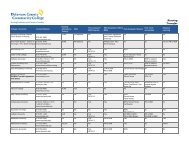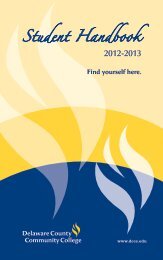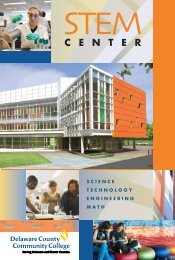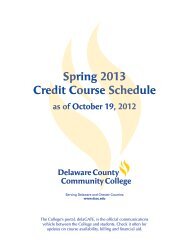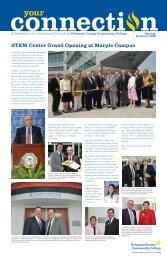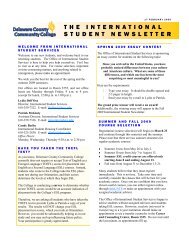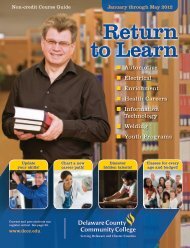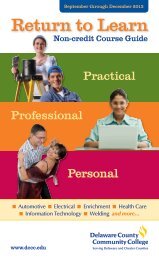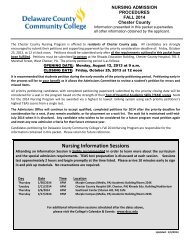2010 Catalog - Delaware County Community College
2010 Catalog - Delaware County Community College
2010 Catalog - Delaware County Community College
Create successful ePaper yourself
Turn your PDF publications into a flip-book with our unique Google optimized e-Paper software.
62 CAREER PROGRAMS, CERTIFICATE<br />
Emergency Services Technology, Certificate<br />
of Competency , ESMC<br />
The Emergency Services Technology, Certificate of Competency prepares<br />
students to function in various disciplines that incorporate similar skills.<br />
Building on the pre/co requisite of being an Emergency Medical Technician or<br />
Paramedic, students will learn emergency management and patient care<br />
techniques that will provide them with the opportunity to become a valuable<br />
part of the emergency services community. In addition, the general education<br />
offerings will benefit students as they work toward an AAS degree.<br />
According to the Emergency Medical Services Advisory Committee, which is<br />
made up of Emergency Medical Services personnel in <strong>Delaware</strong> and Chester<br />
counties, the job market for Emergency Medical Services workers is steady.<br />
The Department of Labor projects a 19% growth in the need for EMT’s<br />
through 2016. This data indicates that there is an ongoing need for welltrained<br />
Emergency Services personnel. In both <strong>Delaware</strong> and Chester counties,<br />
there are pre-hospital service providers as well as fire company / ambulance<br />
corps that serve the residents through the 911 system. These Emergency<br />
Service organizations mandate that their employees maintain current<br />
professional certifications and understand the interactions among agencies<br />
such as homeland security, police, and emergency management. This<br />
Certificate of Competency enables students to meet these requirements.<br />
The mission of the college is to “offer educational programs and services that<br />
are accessible, comprehensive, community centered and flexible in order to<br />
enhance the development of the community and residents of its service area”.<br />
This curriculum is geared towards the individual who has a desire to enter the<br />
public service area and serve residents of <strong>Delaware</strong> and Chester Counties, and<br />
is highly compatible with the college’s mission.<br />
The new curriculum will utilize existing courses.<br />
First Semester:<br />
Credits:<br />
EMS 100 Emergency Medical Technician – Basic……………….... . . . . 7<br />
EMER 105 Incident Management (OR) ………………………….. . . 3<br />
EMER 110 Emergency Planning…………………………………….. . 3<br />
NUS 102 Nursing Mathematics……………………………………. . 1<br />
11<br />
Second Semester:<br />
EMS 120 Airway Management and Ventilation (OR) ……………. . . . 3<br />
EMS 110 Patient Assessment………………………………………. 3<br />
CHE 105 Technical Chemistry (OR) . . . . . . . . . . . . . . . . . . . . . . . . . . . . . . 3<br />
ESS 100 Earth Science…………………………………………….. 4<br />
AHN 106 Patient Care Assisting Techniques……………………….. . . 4<br />
10-11<br />
Total – 21-22 credits<br />
Students interested in being a certified EMT will need to complete a criminal<br />
background check.<br />
Entrepreneurship – Certificate of<br />
Competency (BUSE)<br />
The Certificate in Entrepreneurship was created to meet the needs of students<br />
who want to develop and run their own companies or engage in<br />
entrepreneurship management practices. Through courses such as<br />
Introduction to Entrepreneurship, Financial Planning Business Communications,<br />
and Law for the Entrepreneur, students gain insight into what skills are needed<br />
to become an Entrepreneur. The program is intended to integrate key<br />
requirements of any entrepreneurial effort. It requires a minimum of 22 credit<br />
hours and is comprised of seven courses.<br />
The certificate program is designed to prepare students in both operational<br />
and skill aspects of the small enterprise. Such preparation will equip students<br />
with specific areas of skills or management to either enter an existing small<br />
firm or begin their own entrepreneurial enterprise.<br />
Courses are designed so that the student, through logical steps, understands<br />
the principles unique to small business operation. Successful completion of 22<br />
credits may lead to a certificate of competency in Entrepreneurship. Practical<br />
knowledge in small business management, finance, marketing, sales,<br />
advertising and supervision are designed to prepare students for entry-level<br />
needs. Generally, transfer is not intended through this program. The Dean,<br />
Business/Computer Information Systems, should be consulted when<br />
considering use of credits for transfer.<br />
<strong>College</strong>-Sponsored Experiential Learning may be taken for credit while<br />
working in a small business with specific managerial duties.<br />
Upon successful completion of this program, students should be able to:<br />
• Write a Business Plan.<br />
• Use terms and tactics within the small business environment.<br />
• Be able to develop a marketing plan.<br />
• Analyze and resolve problems involving finance.<br />
• Understand personal qualities needed to function effectively with<br />
individuals in supervision, evaluation and control.<br />
• Understand current legal issues involved in starting and operating a<br />
business.<br />
• Develop effective communication to administer policy both internally and<br />
externally.<br />
Course<br />
Credits<br />
BUS 105 Introduction to Entrepreneurship. . . . . . . . . . . . . . . . . . . . . . . . . 3<br />
BUS 106 Entrepreneurship Seminar . . . . . . . . . . . . . . . . . . . . . . . . . . . . . . 1<br />
BUS 130 Business to Communications. . . . . . . . . . . . . . . . . . . . . . . . . . . . 3<br />
BUS 211 Supervision . . . . . . . . . . . . . . . . . . . . . . . . . . . . . . . . . . . . . . . . . 3<br />
BUS 230 Principles of Marketing . . . . . . . . . . . . . . . . . . . . . . . . . . . . . . . . 3<br />
BUS 233 Financial Planning . . . . . . . . . . . . . . . . . . . . . . . . . . . . . . . . . . . . 3<br />
BUS 243 Legal Environment of Business . . . . . . . . . . . . . . . . . . . . . . . . . . 3<br />
_______ Business Elective . . . . . . . . . . . . . . . . . . . . . . . . . . . . . . . . . . . . . 3<br />
22<br />
Total Credits Required: 22<br />
Health Unit Coordinator, Certificate of<br />
Competency (AHU)<br />
The Health Unit Coordinator certificate program prepares students to<br />
participate as members of the health team in performing clerical skills essential<br />
for the effective management of clinical units within health institutions and<br />
agencies. Applicants are required to have a high school diploma or equivalent.<br />
All Health Unit Coordinator applicants are required to submit a "Criminal<br />
History Record Information Report" and "Child Abuse History Clearance”.<br />
Students who have been convicted of a felony or other prohibited offense may<br />
be unable to complete their studies because clinical agencies may not permit<br />
participation in clinical experiences.<br />
All Health Unit Coordinator students will need to have on file in the Health<br />
Center the results of a complete physical examination including: laboratory<br />
tests, a complete blood count, serology and a 9-panel urine drug screen and<br />
TB testing prior to beginning the clinical component of the program.<br />
Additionally, students must have medical health insurance and be in<br />
compliance with recommendations for the Hepatitis B vaccine.<br />
Certain manual dexterity and sensory skills that enable students to<br />
competently perform required technical skills are necessary for successful<br />
DELAWARE COUNTY COMMUNITY COLLEGE




